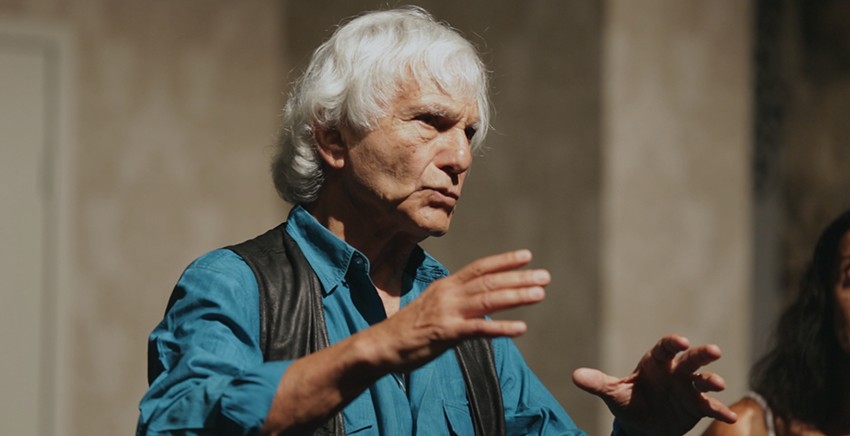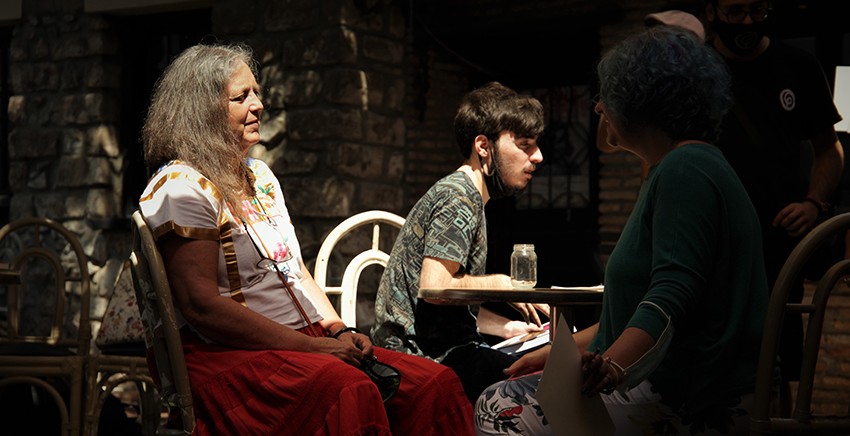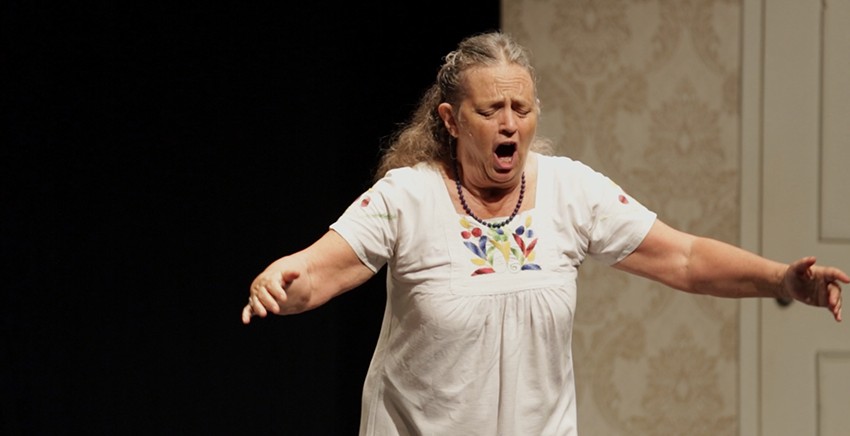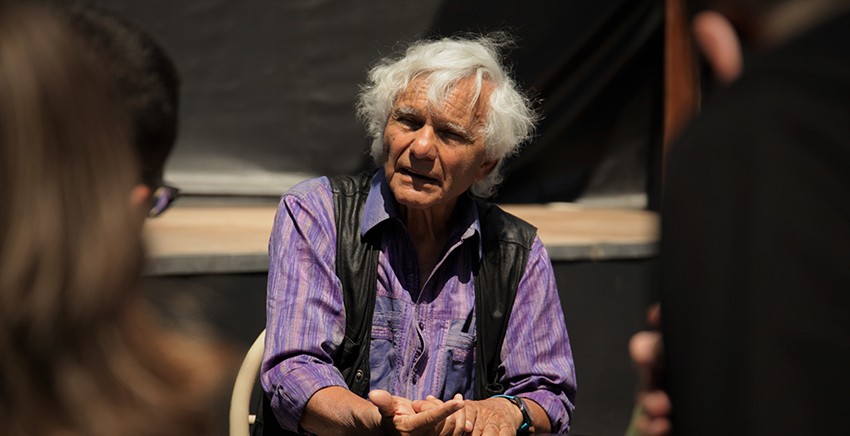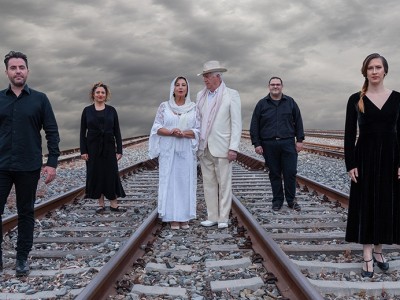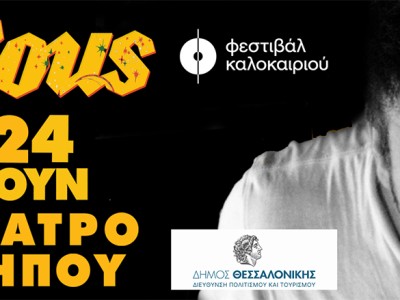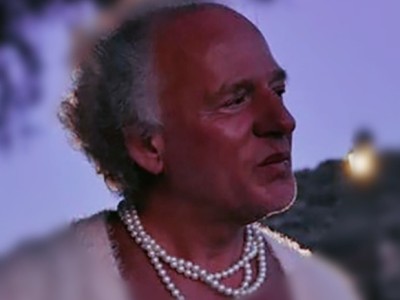Point Of View
The country where the trees fly *
Νάγια ΠαπαπάνουΗ πολυδραστική Ομάδα Τέχνης Fabrica Athens, στο πλαίσιο των εκπαιδευτικών της δράσεων, υποδέχτηκε τον διεθνούς φήμης θεατρικό σκηνοθέτη Eugenio Barba, ιδρυτή της πρωτοποριακής ομάδας Odin Teatret και του ISTA – International School of Theater Anthropology. Μαζί του, ηταν η ηθοποιός και σκηνοθέτης, Julia Varley. Το Πολυθεματικό Σεμινάριο πραγματοποιήθηκε Σάββατο 12 & Κυριακή 13 Ιουνίου 2021, στο Θέατρο Χυτήριο – Σημείο Πολιτισμού.
Το πρόγραμμα του πολυθεματικού σεμιναρίου ξεκίνησε με την διάλεξη του Eugenio Barba: “Politics by other means. Theatre in the Heart of a Lacerated Society”¹, και συνεχίστηκε με την προβολή της ταινίας ντοκιμαντέρ “The country where the Trees Fly”² των Davide Barletti και Jacopo Quadri, το οποίο παρακολουθεί τις προετοιμασίες του εορτασμού των 50 χρόνων του Odin Teatret. Την δεύτερη ημέρα του σεμιναρίου παρακολουθήσαμε την Performance Work Demonstration “The Flying Carpet”³ με την Julia Varley. Και τις δύο ημέρες υπήρχε ικανός χρόνος για την απεύθυνση ερωτήσεων στους προσκεκλημένους Eugenio Barba και Julia Varley. Το σεμινάριο του οποίου ηγήθηκαν μεταμορφώθηκε σε εμπειρία ζωής, καθώς και οι δύο μοιράστηκαν με θάρρος και γενναιοδωρία προσωπικές τους ιστορίες αλλά και στιγμιότυπα από την πολυδιάστατη πορεία του Odin Teatret, αλλά και από το ατομικό τους ταξίδι στην προσπάθεια να καταστήσουν “το αδύνατο δυνατό”. Όμως με το παρόν άρθρο θα ήθελα να επικεντρωθώ στο πρώτο μέρος του σεμιναρίου, την διάλεξη του Eugenio Barba.
Ο Eugenio Barba ίδρυσε το Odin Teatret στην Νορβηγία και δύο χρόνια μετά το 1966, αποδέχτηκε την πρόσκληση του Δημάρχου του Χόλστεμπρο να μετεγκατασταθούν σε αυτή την μικρή, συντηρητική, σχεδόν “καλβινιστική” πόλη όπως την περιέγραψε η Julia Varley. Επρόκειτο για μια προσπάθεια του Δημάρχου του Χόλστεμπρο προκειμένου να αντιμετωπίσει το μεγαλύτερο πρόβλημα της πόλης: ο νεαρός πληθυσμός την εγκατέλειπε, κι η στρατηγική του ήταν να δώσει κίνητρο στους νέους να παραμείνουν. Ο επαναπροσδιορισμός του χαρακτήρα της πόλης σε ένα κέντρο τεχνών και πολιτισμού υποστηρίχτηκε παράλληλα και από την ίδρυση ενός Μουσείου Τεχνών με πίνακες τεσσάρων νέων Δανών εικαστικών και την τοποθέτηση ενός αγάλματος του Giacometti μπροστά από το παλιό δημαρχείο. Το σύμβολο της πολιτιστικής επανάστασης του Χόλστεμπρο ήταν ένα μπρούτζινο άγαλμα “Γυναίκα πάνω σε καρότσι” του Alberto Giacometti, και το 2014, στην επέτειο 50 χρόνων του Odin Teatret, η ‘Maren’ – όπως ονομάζεται αυτή η φίνα φιγούρα του Ελβετού γλύπτη, ήταν το κύριο έμβλημα του ‘Festuge’ (μια εβδομάδα εορταστικών εκδηλώσεων που επαναλαμβάνεται ετήσια στην πόλη).
Σε αυτή την συντηρητική πόλη, το Odin Teatret και οι ηθοποιοί του ήρθαν αντιμέτωποι με το αδύνατο. Ερχόμενοι από την Νορβηγία, οι ηθοποιοί δεν μιλούσαν την γλώσσα των δυνητικών θεατών, αν και κανείς δεν ενδιαφερόταν για το θέατρο – στην αρχή έπαιζαν με 1 ή 2 θεατές. Όμως δεν εγκατέλειψαν τον αγώνα, άλλωστε όπως λέει συχνά ο Barba “θέατρο είναι να καθιστάς το αδύνατο δυνατό”. Η Julia Varley διηγήθηκε πως παρέλασαν ήσυχα ως το ταχυδρομείο στις 4 τα ξημερώματα για να παραδώσουν μια χειροποίητη καρτ ποστάλ προκειμένου να εκφράσουν την ευγνωμοσύνη τους σε αυτούς που μεταφέρουν τις ευχές και τις εξομολογήσεις των αγαπημένων μας. Άλλοτε πρόσφεραν εσπρέσο στους φουρνάρηδες στις 5 το πρωί για να ευχαριστήσουν αυτούς που ετοιμάζουν το καθημερινό ψωμί και συμμετέχουν στους εορτασμούς μας με τα γλυκά τους. Με τον καιρό αυτές οι δράσεις εν είδη καλλιτεχνικών παρεμβάσεων έγιναν το σημείο εκκίνησης για να οικοδομηθούν σχέσεις, για να συνδεθούν το θέατρο και οι ηθοποιοί με την καθημερινή δραστηριότητα.
Η δημιουργία αυτών των δεσμών με την κοινότητα επέτρεψε το ‘barter’. Barter είναι η ανταλλαγή πολιτιστικών εκδηλώσεων, η οποία επιτρέπει μια εμπειρική βίωση των αλλότριων μορφών έκφρασης, ταυτόχρονα είναι μια κοινωνική διάδραση που υπερνικά τις προκαταλήψεις, τις γλωσσικές δυσκολίες και τις διαφορές στην σκέψη, την κρίση και την συμπεριφορά ⁴. Στην διάρκεια του Festuge, το Odin Teatret συγκέρασε τις “αντίθετες” πλευρές δια μέσω της παράστασης. Παραδείγματος χάριν, ο Eugenio Barba διηγήθηκε πως προτάθηκε στον στρατό να συμμετέχει στις εκδηλώσεις ενός Festuge, οπότε οι στρατιωτικοί κατασκεύασαν ένα σημείο – πύλη ελέγχου αντίστοιχο αυτού που έχει κατασκευαστεί στην Λευκωσία. Οι κάτοικοι του Χόλστεμπρο το βρήκαν διασκεδαστικό να διέρχονται του σημείου ελέγχου, από την άλλη πλευρά όμως βρίσκονταν υπέρμαχοι της ειρήνης οι οποίοι τους πληροφορούσαν για την αποστρατικοποίηση.
Ο Eugenio Barba, στο πέρασμα του χρόνου έχει προσκαλέσει και συμπράξει καλλιτεχνικά με ερμηνευτές από όλο τον κόσμο (Κένυα, Ιαπωνία, Μπαλί, Βραζιλία, Ινδία κα), στην διάρκεια αυτών των Festuge δεν συνεργάζονται μόνο οι ηθοποιοί και τα μέλη του Odin Teatret με τους προσκεκλημένους καλλιτέχνες αλλά όλος ο πληθυσμός – τουλάχιστον κάποιοι άμεσα κι οι υπόλοιποι έμμεσα καθώς γίνονται μάρτυρες αυτών των παραστάσεων και βιώνουν την ανταλλαγή της ενέργειας στον χώρο και τους ανθρώπους. “Αυτή η πολιτισμική – πολιτιστική διάδραση οδήγησε στην εξαφάνιση του ρατσισμού;”, “Όχι”, απαντά ο Eugenio Barba, όμως ενδυνάμωσε την ανοχή στην διαφορετικότητα. Και σε αυτό το σημείο ο τίτλος της διάλεξης του, ”Politics by other means. Theatre in the Heart of a Lacerated Society” αποσαφηνίζεται. Προσωπικά θα θεωρούσα θαυματουργό και ευτυχή ημέρα την ημέρα που ένας άνθρωπος θα αποποιούνταν τον ρατσισμό επειδή παρακολούθησε την παράσταση του έργου του Bernard-Marie Koltès, “Αγώνας νέγρου και σκύλων”. Αλίμονο, η πραγματικότητα απέχει παρασάγγας.
Ο Eugenio Barba στην έναρξη της διάλεξης μοιράστηκε την προσωπική του εμπειρία ως προς την μετανάστευση, αφού κι ο ίδιος έφυγε νέος από την Ιταλία και μετανάστευσε στην Νορβηγία όπου έζησε 12 χρόνια. Η διαδικασία του να ορίσεις εαυτόν είναι μια πορεία αδύνατη που καθιστούν δυνατή οι φωνές των προγόνων μας εάν τους επιτρέψουμε να μας μιλήσουν και τις ακούσουμε. Το μοίρασμα αυτών των βιωμάτων καθώς και αποσπασμάτων – στιγμιότυπων από την ιστορία του Odin Teatret ενίσχυσε την κατανόηση αυτού του ειδικού ρόλου του θεάτρου. Η επιμονή του Odin Teatret σε μια συγκεκριμένη διαδικασία δουλειάς, μια καθημερινή εργασία του επέτρεψε να ριζώσει. Οι ρίζες στήριξαν το δέντρο να μεγαλώσει κλαδιά, λουλούδια, καρπούς και να γίνει δάσος.
Το 2009 ο Augusto Boal έγραψε το μήνυμα για την Παγκόσμια Ημέρα Θεάτρου: “ Είμαστε όλοι ηθοποιοί: το να είσαι πολίτης δεν σημαίνει ότι ζεις σε μια κοινωνία, σημαίνει ότι την αλλάζεις. ”⁵. Κι αυτό ακριβώς έκανε το Odin Teatret για περισσότερες από 5 δεκαετίες στο Χόλστεμπρο. Πρόσφατα, σε μια συνέντευξη ο Eugenio Barba είπε ότι το Odin Teatret θα εξαφανιστεί μετά τον θάνατο τους, γιατί το θέατρο είναι οι άνθρωποι και οι άνθρωποι πεθαίνουν. Η αντίδραση του κόσμου ήταν αστραπιαία και άμεση: τον σταματούσαν όπου τον έβλεπαν και του έλεγαν ότι αυτό δεν μπορεί να είναι το τέλος. Η αντίδραση αυτή οδήγησε το Odin Teatret να διερευνήσει μέσα και στρατηγική για την συνέχεια.
Επέλεξα τον ίδιο τίτλο για το άρθρο αυτό με τον τίτλο του ντοκιμαντέρ: “The country where the trees fly”, γιατί αυτός ο τίτλος με ιντρίγκαρε και με έβαλε σε σκέψη για αυτά που άκουσα και ένοιωσα στην διάρκεια του σεμιναρίου. Ζούμε σε ένα κόσμο όπου η μετανάστευση και η συνεχής μετακίνηση πληθυσμών αιτία φυσικών καταστροφών ή ανθρωπίνων παρεμβάσεων αποτελούν ένα ολοένα αυξανόμενο φαινόμενο. Προσπάθησα να ακούσω τις φωνές των προγόνων μου: είμαι εγγονή ενός πρόσφυγα και κόρη ενός μετανάστη. Οραματίστηκα ένα δέντρο οι σπόροι του οποίου μεταφέρονται με τον αέρα και ξεκινούν το ταξίδι τους να γίνουν δέντρα σε άλλους τόπους, όμως ο πρόγονος τους βρίσκεται πάντα εντός τους να τους υπενθυμίζει ποιοι είναι. Τα δέντρα πετούν σε μια χώρα που εκτιμά τις ρίζες των δέντρων της ανεξάρτητα από που έφερε ο άνεμος τον σπόρο τους.
*Documentary Film “The country where the Trees Fly” by Davide Barletti and Jacopo Quadri
** Οι φωτογραφίες είναι του Γιώργου Σιντόση της ομάδας Cinemascoop
*** Το άρθρο έχει γραφτεί και στις δύο γλώσσες από την συγγραφέα του
¹ “Πολιτική με άλλα μέσα. Το θέατρο στην Καρδιά μιας Τραυματισμένης Κοινωνίας”
² “Η χώρα όπου τα Δέντρα Πετούν”
³ Επίδειξη εργασίας στην ερμηνεία “Το Ιπτάμενο Χαλί”
⁴ από την ιστοσελίδα του Odin Teatret https://odintheatre.dk/about-us/about-odin-theatre/
⁵ Μετάφραση: Βίκυ Μαντέλη, Νεόφυτος Παναγιώτου
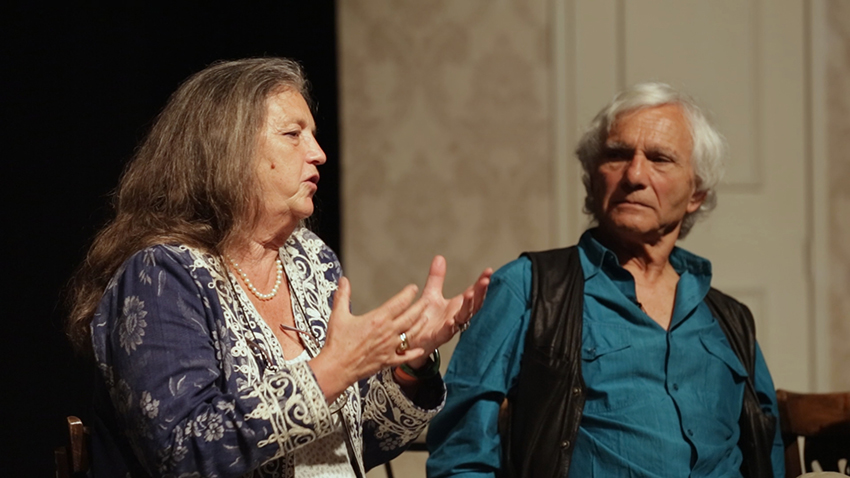
“The country where the trees fly” *
The Multiactive Art Group Fabrica Athens, as part of its educational activities, welcomed the internationally renowned theater director Eugenio Barba, founder of the pioneering group Odin Teatret and ISTA -International School of Theater Anthropology. With him, has been the actress and
director Julia Varley. The Multidisciplinary Seminar «Theater as a Dialogue with the Dead - Keeping Alive a Personal Tradition» took place on Saturday 12 & Sunday 13 June 2021, at the Chytirio Theatre - Cultural Center.
The program of the multidisciplinary seminar started with Eugenio Barba’s lecture on the topic: “Politics by other means. Theatre in the Heart of a Lacerated Society”, followed by the screening of the Documentary Film “The country where the Trees Fly” by Davide Barletti and Jacopo Quadri, that shows the preparations of the 50 years anniversary of Odin Teatret. Second day of the seminar, we watched a Performance Work Demonstration “The Flying Carpet” with Julia Varley. Both days had sessions of questions and answers where we had the chance to address both Eugenio Barba and Julia Varley. The seminar led by them has transcended into a living experience, as they were both brave and generous into sharing private stories from the multidimensional history of Odin Teatret, as well as their individual journey into how to make the impossible possible. However, with this article I wish to focus at the first part of the seminar, that is the lecture of Eugenio Barba.
Eugenio Barba funded Odin Teatret in Norway, and two years later, in 1966 he was invited by the Mayor of Holstebro to relocate their theatre in this small, austere almost ‘Calvinist’ city as Julia Varley described it. This was an attempt of the Mayor of Holstebro to face the major problem of the city: young population was leaving, and his strategy was to give the youth of the city motivation to stay. Redefining the profile of this city into an art and culture center was also supported by the foundation of an Art Museum with paintings of young Danish artists and the placing of a Giacometti statue in front of the old Town Hall. The symbol of the culture revolution in Holstebro is ‘Woman on Cart’, a bronze statue by Alberto Giacometti, and in 2014 with the 50-year anniversary of Odin Teatret, ‘Maren’ – the name of this Swiss sculptor's fine figure - was the main emblem of the ‘Festuge’ (a week of festivities all around the city occurring once every year) that took place.
In this austere city, Odin Teatret and their actors were faced with challenges beyond comprehension. Coming from Norway, actors were not speaking the language of prospective spectators, moreover no one was interested into theatre; in the beginning they performed with one or two spectators. But they didn’t give up, after all “theatre is the impossible made possible “, as Barba frequently says. Julia Varley narrated how they would parade quietly through the city to the post office to give postcards to postmen at 4 o’ clock in the morning to show the gratitude for those delivering the wishes and the confessions of our loved ones. Another time they would offer espresso at 5 o’ clock in the morning to the bakers who provided every day’s bread and pastry for celebrations. Over time these actions – that were dressed into artistic performances - became the starting point to build relations, to liaise the theatre and performers with everyday activity.
Creating these bonds with the community allowed for the ‘barter’. Barter is an exchange of cultural manifestations and offers not only an insight into the other's forms of expression, but is equally a social interaction which defies prejudices, linguistic difficulties and differences in thinking, judging and behaving (from the website of Odin Teatret https://odintheatre.dk/about-us/about-odin-theatre/). During the Festuge, Odin Teatret would bring together “opposite” sides in a manner of performance. For example, Eugenio Barba narrated how military were proposed to take part in the celebrations of the Festuge, and in such they would build a check point like those built by UN troops in Nicosia, Cyprus and elsewhere. The habitants of Holstebro found it amusing passing through the check point, but on the other side there were pacifists handing out leaflets informing about demilitarization.
Eugenio Barba, over the years has invited and co – performed with artists from all over the world (Kenya, Japan, Bali, Brazil, India and more), and during these Festuges it was not just the members of Odin Teatret that collaborated with the visiting performers but the whole population of the city – or at least a part of it directly and other indirectly by witnessing the activities and experiencing the energy exchange in space and persons. Has this cross-cultural interaction made racism disappear? “No”, says Eugenio Barba, but it has strengthened tolerance for diversity. And this is the point where the title of this lecture:” Politics by other means. Theatre in the Heart of a Lacerated Society” becomes clearer. To me it would be a miracle, a joyful day, the day that a person will stop being racist because them watched a performance of “Battle of negro and dogs”, by Bernard-Marie Koltès. Alas, reality is far from there.
Eugenio Barba at the beginning of his lecture gave insight on how he experienced immigration when he left Italy for Norway where he lived for twelve years. Defining one's self is an impossible journey made possible if only we allow the voice of our ancestors to speak out. Sharing these personal stories and fragments of the history of Odin Teatret strengthened the understanding of this particular role of theatre. The perseverance of Odin Teatret into a manner of work, an everyday routine labor has allowed to roots grow deep. Roots supported the tree to grow branches, flowers, fruits and eventually expand to a forest. In 2009, Augusto Boal wrote the World Theatre Day Message, and I quote: “We are all actors: being a citizen is not living in society, it is changing it”. And that is exactly what the presence and practice of Odin Teatret has done in Holstebro for more than five decades. When recently Eugenio Barba said during an interview, that Odin Teatret will disappear after their death, because theatre is their people and people die, the reaction of the citizens of Holstebro was sharp and direct: people approached him on the street telling him this cannot be the end. The reaction of the people led Odin Teatret into seeking for the means and the strategy to continue.
I named my text after the title of the documentary: “The country where the trees fly”, because the title intrigued me and has made me think in relation to what I have heard and felt during the seminar. We live in a world where immigration and continuous movement of populations due to natural or human inflicted disasters, is a growing phenomenon. I tried to listen to the voices of my ancestors; I am the granddaughter of a refugee and the daughter of an immigrant. I visualized a tree whose seeds will be carried by the wind and they will start their journey to become trees somewhere else, but their ancestor will always be inside them to remind who they are. Trees fly in a country that appreciates the roots of their trees no matter where the wind carried them from.
* Documentary Film “The country where the Trees Fly” by Davide Barletti and Jacopo Quadri
** Photos were taken by Giorgos Sintosis of Cinemascoop
*** the article is written in both languages by the author
ΔΙΑΒΑΣΤΕ ΑΚΟΜΑ
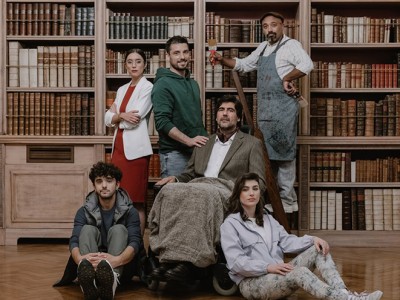
Οι Άθικτοι (The Intouchables) σε σκηνοθεσία Νικορέστη Χανιωτάκη
Μια αληθινή ιστορία για τη φιλία, τη χαρά της ζωής και το άνοιγμα σε νέους κόσμους και εμπειρίες εκεί που δεν το περιμένεις... Μια Ωδή στην Ψυχή και την Ανθρωπιά! ...
Σχόλια χρηστών
Για να συμμετέχετε στην συζήτηση πρέπει να γίνετε μέλη. Λάβετε μέρος σε κάποια συζήτηση κάνοντας roll-over στο αρχικό σχόλιο και πατήστε το κουμπί "Απάντηση". Για να εισάγετε ένα νέο σχόλιο χρησιμοποιήστε την φόρμα στο τέλος της λίστας.

